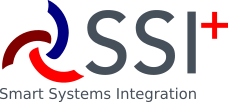

Dear Visitor,
The SSI+ programme no longer accepts applications. Our new programme SSIs (Smart Systems Integrated Solutions) can be found here.
The SSIs team
Joint International Master in Smart Systems Integration (SSI+): Become an expert in tomorrow’s technology and study in the leading technical institutions of three European countries!
SSI+ is a two-year (120 ECTS) Joint Master Programme, with full student mobility between the three partner institutions with leading expertise in the academic fields of Smart Systems and Microsystems Technology. Read Less...
- Heriot-Watt University (HWU) in Scotland,
- University College of Southeast Norway (HSN), in Norway
- Budapest University of Technology and Economics (BME), in Hungary
The first semester is hosted at HWU in Edinburgh, Scotland. The second semester takes place at HSN in Vestfold, Norway. The third semester is with BME in Budapest, Hungary. The three semesters provide taught courses with extensive laboratory and project work, taking advantage of the complementary expertise at the three institutions. The fourth semester is the master thesis project in which where the students carry out individual projects with the consortium partners, or with industrial or other academic partners, thus offering a broad range of possibilities for specialization for the individual student.
Students may apply for Erasmus+ scholarships to study for the SSI+ programme. The scholarship covers all tuition fees and subsistence costs. Read Less...
- Contribution to subsistence costs: EUR 1.000/month: For the 24 month duration of the programme, except for study or thesis periods in the country of residence and the other conditions of the scholarships
- Contribution to travel and installation costs: EUR 1.000 – 3.000 / year: Depending on country of residence, see Erasmus+ programme guide for details
What are Smart Systems?
Smart Systems are miniaturised systems, combining data processing with multi-modal (optical, biological, mechanical) sensing, actuation and communication functions. Smart Systems are a key driving force for a range of rapidly emerging intelligent and autonomous systems and objects such as self-driving cars, artificial pancreas, Internet of Things (IoT), M2M-enabled advanced manufacturing robots or wellness armbands. Read Less...

Taking often the advantage of miniaturization, they communicate with other “intelligent” systems and are able to analyse complex situations to take autonomous decisions or provide real-time data that allow informed operator decisions. The integration of Smart Systems into large systems provides key technical advantages for increased product competitiveness in the majority of industrial sectors.
The SSI+ programme aims at education and training of master level graduates equipped with both specialist knowledge and skills of the technology field and transferable skills, ready for employment or doctoral study.
Beneficiaries of SSI+ programme
SSI+ is supported by 26 associated partners including 7 international academic and research organisations, 3 industrial bodies (technology platform, network and alliance) and 16 companies in the supply chain of the SSI ecosystem. Read Less...
University partners and collaborating research institutions
- Shanxi University
- Harbin Institute of Technology
- Xi’an Institute of Optics and Precision Mechanics
- Ho Chi Minh City University of Technology
- Nazarbayev University
- Federal University of Rio de Janeiro
- SINTEF
Platform providers, networking and alliance partners
- EPoSS
- Norwegian Centres of Expertise in Micro- and Nanotechnology (NCE-MNT)
- Zhongguanccun Intelligent Hardware Industry Alliance (ZiH)
Industry partners
- ST Microelectronics
- Ovesco
- Memsstar
- GE Vingmed Ultrasound
- Kongsberg Norspace AS
- 7Sense Technologies AS
- Norautron AS
- Techni AS
- Sensonor AS
- Conpart
- Kongsberg Maritime
- Memscap
- Sensocure
- Econ Engineering
- Quantislabs
- National Instruments
Disclaimer: This project is funded with support from the European Commission. The information reflects the views only of the consortium, and the Commission cannot be held responsible for any use which may be made of the information herein.
Contact
Dr Changhai Wang (C.Wang@hw.ac.uk)
Overall Coordinator
Heriot-Watt University


